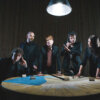It’s that time already and following April’s ‘Senses Out Of Control’ EP, comes the long-awaited Sonics in the Soul long player. As summer becomes but a distant memory of sweaty nights and ice cream that melted before you took it from the vendor, comes Steve Diggle and co’s 11 track canvas. A band whose moniker is surely now part of the English language, Buzzcocks have brought out an album I immediately warmed to. These songs are as every bit as moreish as the sweetest candy. This is power-pop that will have you singing along to every track as soon as the needle finds the groove, or your finger hits play. The songs posses a narcotic quality that will make sense of the fact they have endured fashion’s ebbs and flows.
Announcing the album is that EP’s lead track ‘Senses Out of Control’, one embodied by Mani Perazzoli’s rollercoaster guitar and the memorable hook “…All my dreams have hit the ground, with my senses out of control…”. A number which flows easily and with Danny Farrant’s solid back line, creates the perfect platform upon which Steve Diggle’s vocal is hooked. Up next is ‘Manchester Rain’, a number well suited for announcing autumn’s coming and making good use of the phaser on the opening guitar. Diggle sings, “How’d you solve a problem deep inside you, how’d you solve a problem you can’t explain, standing on a corner, standing in the Manchester rain…” A tune which makes good use of the song’s title, but rather than the drab backdrop of an L.S. Lowry painting, it lifts the mood easily by its sunshine and pace. You Changed Everything Now’ is a perfect pop love song, in which Diggle proves his credentials as one of the foremost songwriters to come out of punk in the 70s. With an incredible hook, it’ll have you returning to sing the chorus “…you changed everything now…”, over and over. It’s light and breezy melody, the signature of a Buzzcocks tune.
The chug-chug and solid drum beat of ‘Bad Dreams’ comes next and rings of original punk-rock, the optimistic vocal “…having bad dreams, but now they’re gone…” might not ring of the 1970s, but the disjointed chords would say otherwise. Talking of optimism ‘Nothingless World’, is a title that strikes contradiction. A melody that will lift a smile from the darkest frown, while Diggle sings “…all your words come back in a heap, so roll away and fall back to sleep. ‘Cos nothing means nothing in a nothingness world…”, if we were talking perfect pop, then this number that comes in at just over 3 minutes is certainly it.
We’re not even halfway through Buzzcocks’ lockdown project, and its energy speaks of how high Diggle and co. have kept the flag flying. ‘Don’t Mess With My Brain’, is the line that opens the song, as Diggle sings “Don’t mess with my brain, 65 million going insane. Fever is high, feelings are low, gazing out the window and there’s nowhere to go…”, of course this was how we all had felt during lock-down. I say all, but it’s now clear this was as long as you were not in government, but that’s for another album. The following track ‘Just Got To Let It Go’ is a fierce punk-rock number, in which the 67-year-old Diggle re-stakes his claim at once being a misunderstood youth. As major chords meet with the vocal “It’s so easy to be under attack, it’s so easy jumping on my back…” during an almost blink and you’d miss it 2’27” of song writing magic. This, like the album is a tune which is tremendously easy to accept. My only issue is when Diggle sings “…you just gotta let it go man…” at the end of a chorus, “man” just doesn’t sit right, but here I accept I’m just being picky, at what is solid power-pop. Continuing in the same vein, ‘Everything is Wrong’ is yet another demonstration of what is power-pop. I can hear Diggle in optimistic tone singing “…they say nothing lasts forever, when you’re going through bad weather…”, a perfect note to strike when you find yourself up against it. Perhaps the perfect song to keep in reserve.
We’re on the home stretch now, as ‘Experimental Farm’ peeps out from beneath the covers. Is it really a take on genetically engineered farming practices? Diggle voices these concerns, but perhaps he’s just expressing those at a right wing government and the socially engineered policies that have been on the statute. However this might sit, it features a fine guitar riff. ‘Can You Hear Tomorrow’ is next and with the Tick-Tock drum pattern, suggesting the passing of time, as the songwriter is heard singing the line “…can you hear tomorrow…”. A song full of nervous energy, voicing the concerns of exactly what will tomorrow bring. Cleverly compiled, we are now at the album’s sign-off, as ‘Venus Eyes’ suggests perhaps a warmth or magnetism of the subject to this song. I would describe this as more of an album track, although perfectly placed after what were a few intense journeys.
An album that clocks in at 36 minutes, which over 11 tracks plays out extremely well, never once allowing the listener to tire of what was being performed. I’m going to suggest this is an album that plays well to the memory of founding member Pete Shelley, while still looking to the future of the group.




